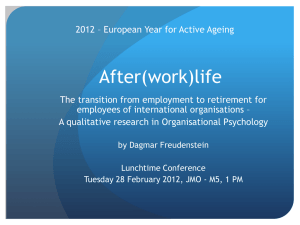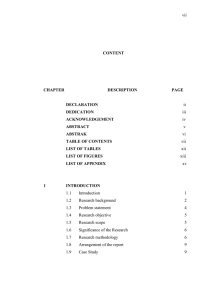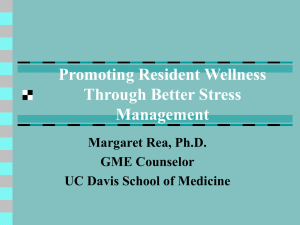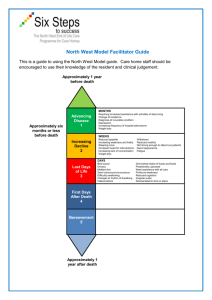Growing old on the Barrier - Aotea Family Support Group Charitable
advertisement
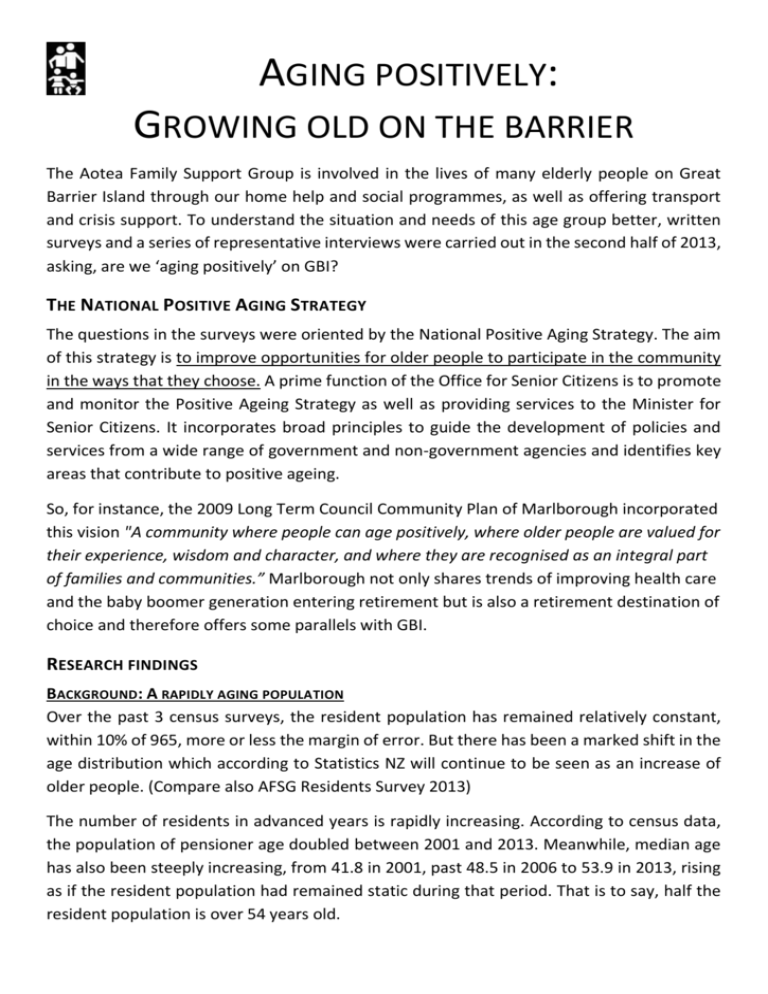
AGING POSITIVELY: GROWING OLD ON THE BARRIER The Aotea Family Support Group is involved in the lives of many elderly people on Great Barrier Island through our home help and social programmes, as well as offering transport and crisis support. To understand the situation and needs of this age group better, written surveys and a series of representative interviews were carried out in the second half of 2013, asking, are we ‘aging positively’ on GBI? THE NATIONAL POSITIVE AGING STRATEGY The questions in the surveys were oriented by the National Positive Aging Strategy. The aim of this strategy is to improve opportunities for older people to participate in the community in the ways that they choose. A prime function of the Office for Senior Citizens is to promote and monitor the Positive Ageing Strategy as well as providing services to the Minister for Senior Citizens. It incorporates broad principles to guide the development of policies and services from a wide range of government and non-government agencies and identifies key areas that contribute to positive ageing. So, for instance, the 2009 Long Term Council Community Plan of Marlborough incorporated this vision "A community where people can age positively, where older people are valued for their experience, wisdom and character, and where they are recognised as an integral part of families and communities.” Marlborough not only shares trends of improving health care and the baby boomer generation entering retirement but is also a retirement destination of choice and therefore offers some parallels with GBI. RESEARCH FINDINGS BACKGROUND: A RAPIDLY AGING POPULATION Over the past 3 census surveys, the resident population has remained relatively constant, within 10% of 965, more or less the margin of error. But there has been a marked shift in the age distribution which according to Statistics NZ will continue to be seen as an increase of older people. (Compare also AFSG Residents Survey 2013) The number of residents in advanced years is rapidly increasing. According to census data, the population of pensioner age doubled between 2001 and 2013. Meanwhile, median age has also been steeply increasing, from 41.8 in 2001, past 48.5 in 2006 to 53.9 in 2013, rising as if the resident population had remained static during that period. That is to say, half the resident population is over 54 years old. And the Over 65s have more than doubled in little more than a decade, from counting 93, past 144, to reach 210 during that same period. That means, that another 250 or so will be Over 65 within a decade. THIS SURVEY, ANALYSIS AND INTERPRETATION The research was aimed at people over 60 resident on GBI. There were two parts, one was a mail out survey to all seniors on the AFSG database. The second was a series of 20 face-toface interviews with a representative cross-section of residents, that is as diverse as possible in terms of geography, ethnicity, financially, and living situation as achievable. The survey was sent out to all on the mailing list for the Over 60s invites, about 120, as well as another 30 seniors also on the database. 55 people responded, representing perhaps 20-30% of permanent residents of the over 60 age group. Only 4 identified themselves as partly or wholly Maori. Three respondents under 60 were excluded, since low number of responses made the data for that age bracket statistically ambiguous. While the age breakdown is not quite representative when compared to the census data, it remains very valuable data. No age group is disproportionally represented. It is therefore possible to compare how different age groups rated the questions posed. RESPONDENTS PROFILE Male and females were equally divided, ages were spread out but Maori were underrepresented. FINDINGS GBI IS A RESIDENCE OF CHOICE FOR MOST AGED PEOPLE, BUT THEY ARE NOT RECENT COMERS. 80% of respondents have lived on GBI for over 10 years. At least 75% have spent most of their lives elsewhere. But a little over 20% have been on the island at least 4 decades. MOST LIVE ALONE BUT DO FEEL SUPPORTED Over 50% live alone and most of the remainder live with a partner. Only 2 had a house mate and another 2 lived with family. Twenty out of 55 respondents consider themselves in need of part-time assistance to get by rather than living independently. Nearly two in three of the respondents living alone consider themselves supported, that is with a neighbour or relative to call on for help. However, nearly 20% do consider themselves unsupported. LACK OF TRANSPORT AFFECTS A SMALL PROPORTION OF RESIDENTS Of all survey respondents, 13% felt in need of support to get around. Of the people interviewed, 70% had own transport but most felt need for bus service on island, with the use of the Gold Card for all travel including on / off island travel. SOME ARE RETIRING EARLY , OTHERS ARE WORKING LONGER 15% report to still be working to earn money, but this drops to below 5% by the time the official retirement age is reached. More than half of respondents 60-65 effectively have retired early, since they are not earning more than 20% from working. A quarter of those between 65 and 70 continue to work, but by age 70 the number becomes statistically insignificant. Everybody that was interviewed had income they could survive on but some struggled with mortgage and living expenses. BY 70 STAYING HEALTHY BECOMES CHALLENGING FOR MOST Chronic health issues are of concern to senior residents. Twice as many reported having to deal with chronic health issues as those that did not. There is a marked increase in respondents over 70 reporting chronic health issues. THERE WILL BE INCREASING PRESSURE ON HEALTH PROVIDERS Half of people over 65 and at least 75% of those over 70 experience health problems requiring medical assistance. 150 will have on-going health problems needing assistance. AGING RESIDENTS ARE DISTRESSED BY THE NEED TO MOVE OFF THE ISLAND 90% of individuals interviewed wished there was a retirement village on island that if they were no longer able to stay in their own homes through health needs. At present people have had no option but to leave island and this can be very distressing. PRELIMINARY RESULTS FROM THE 2013 RESIDENTS SURVEY A 25 question survey in November 2013 went to all postal addresses, and 170 were returned. HOME OWNERSHIP: rented owned freehold other AFFORDABILITY: Affordable Expensive 17% 23% 50% 6% HIGHSCHOOL OPTIONS: Correspond Boarding Lodged Move 33% 36% 41% 35% CHILDCARE WANTED : 62% 11% Play centre Kindergarten Montessory Steiner Child care Private 15% 23% 23% 15% 21% 23% RETIREMENT: 77% plan to retire n GBI. RETIREMENT OPTIONS: Own home With family Rented Serviced unit Rest home Ret village 75% 8% 9% 6% 3% 16% THE NEW ZEALAND POSITIVE AGEING STRATEGY The 1999 International Year of Older Persons prompted the development of a New Zealand strategy promoting the value of older people. The Strategy’s 10 goals are used by central and local government agencies to develop their own action plans to improve the wellbeing of older people. “To achieve the vision of a society where people can age positively means directing our collective efforts towards achieving identified positive ageing goals.” The New Zealand Positive Ageing Strategy identifies ten goals: 1. 2. 3. 4. 5. Income – secure and adequate income for older people Health – equitable, timely, affordable and accessible health services for older people Housing – affordable and appropriate housing options for older people Transport – affordable and accessible transport options for older people Ageing in the Community – older people feel safe and secure and can age in the community 6. Cultural Diversity – a range of culturally appropriate services allows choices for older people 7. Rural Services – older people living in rural communities are not disadvantaged when accessing services 8. Positive Attitudes – people of all ages have positive attitudes to ageing and older people 9. Employment Opportunities – elimination of ageism and the promotion of flexible work options 10.Opportunities for Personal Growth and Participation – increasing opportunities for personal growth and community participation (www.msd.gvt.nz)



